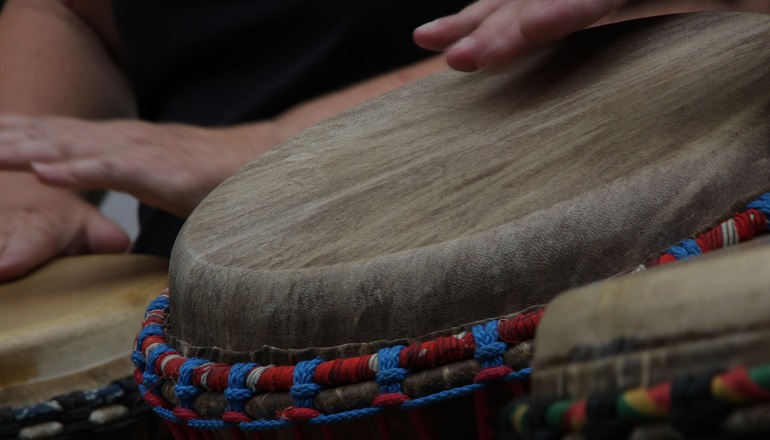Bede Bada Boom Kabede. Bede Bada Boom Kabede. When my daughter, Alia, was two years old, my husband, Andrew, and I often heard her repeating this phrase to herself as she played. It is the sound of the African djembe drum in a children’s book I had read to her—Jamari’s Drum, by Eboni Bynum and Roland Jackson. In the story, the drum is the keeper of peace in the village, and the importance of the rhythm is clear to everyone who hears it.
As transracial adoptive parents, Andrew and I are always looking for ways to embrace the African heritage our daughter shares with her birth father. That’s what brought us to an African drumming and dance workshop when Alia was still an infant. The day’s performance ignited Andrew’s long-time interest in playing a percussion instrument, so he bought a djembe drum and started to take lessons. Little did we know that Andrew had a talent for African drumming, nor that his new hobby would create a special rhythm for our family.
We continue to attend cultural festivals, try African foods, and surround ourselves with art, literature, and music that reflect our child’s heritage. While these experiences are fun and enlightening, none of them entwines itself into our daily lives the way the djembe does. Not only has the djembe given us a core interest as a family, the music seems to resonate around us, leading to connections with many different people and experiences.
Once, when Alia and I were watching Andrew perform at an African drum and dance event, I could literally feel our family rhythm pulsing. As the drumming got louder, Alia turned to me and said, “Mommy, I can feel it in my heart.” She meant the drumming was so loud that it was vibrating in our chests, but I like to think that it signaled something deeper, too.
For both Alia and Andrew, enthusiasm for the djembe has grown stronger over time. Either one can listen to the music endlessly. I admit that the constant beat is sometimes more than my ears can bear. Alia, on the other hand, can fall asleep to the steady rhythm, and she requested “one of my drumming CDs” on the drive to her first day of school, to calm her nerves. That was the day I truly connected with the music.
I dropped Alia off at her classroom and was sobbing by the time I made my way back to the van. Then, when I turned on the ignition, I was greeted by the music’s solid, rhythmic sounds. I immediately felt better, knowing that my daughter had taken strength from this song. If she could get through the next few hours by herself, I could, too.
It has been about four years since the djembe joined our family, and I cannot imagine life without its powerful beat. Djembe enthusiasts say that the music vibrates the soul. Others describe feeling something physically awakening in them the moment they hear the rich sounds. Personally, I find that the rhythms remind me of a collective heartbeat. May Andrew’s drum, like Jamari’s drum, be the keeper of peace in our household, and also the keeper of our family’s unique rhythm.



